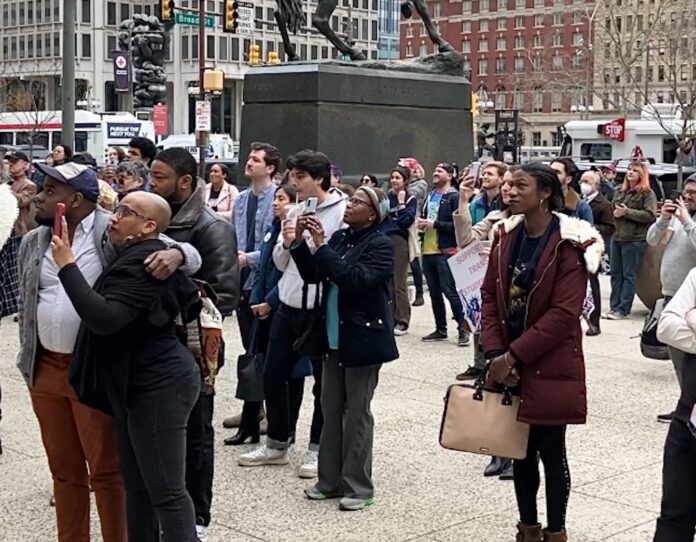The children sitting in the audience at the raising of the trans flag last week at City Hall got a perfect lesson in the intersection of politics and activism. More specifically, they learned that that intersection is often full of disagreements. It’s not all kumbaya.
Which is more effective in helping people: on-the-ground direct action in communities, or lobbying those in political power to make changes in policy? The former often yields short term results, and the latter, at least in theory, yields long term results. When the two are combined, you see sustainable improvement that can truly change a place. But as we’ve seen throughout the fight for LGBTQ equality, there can often be disagreements from those on the front lines of each area.
Last Friday’s flag raising, hosted by the Office of LGBT Affairs, featured speakers who lifted up the trans community and rallied the audience to keep up the support. It comes at a time when the trans community has to deal not only with political, cultural and physical attacks, but with a galvanized right wing who are shamelessly using a school shooting to bolster their anti-trans views. The spectacle of the flag raising helped raise people’s spirits; the speeches helped remind people of the work still to be done, including one speech that was not planned.
Towards the end of the flag raising, Valentina Rosario, who did on-the-ground direct action work as a staff member at galaei, unexpectedly took the microphone and called out those in political power (in this case, the Office of LGBT Affairs) for not doing enough to reach trans people in underserved parts of the city, trans people for which a flag raising means very little, trans people who didn’t even know the flag raising was happening because they don’t have a smartphone or internet or place to live.
Putting aside Rosario’s issues with the Office of LGBT Affairs, her larger point — that there are LGBTQ people in Philadelphia who need more than a symbolic gesture of support — is a valid one, and it seemed the audience, who paid attention to her and applauded her when she finished, understood it fully. Improving the lives of trans people can’t be achieved by greater visibility alone, especially if that visibility only occurs in neighborhoods like Center City.
Rosario mentioned neighborhoods and streets that the average Center City resident has probably never thought about: Olney, Fairhill, Kensington, Tacony, Woodland Avenue. She mentioned the sex workers who often go unacknowledged by many in government. She mentioned those without housing who often find it difficult to navigate the shelter system because of their gender identity. She mentioned the deaths that serve as flash points but then fade from people’s memory just as quickly.
In the ongoing fight to improve the lives of LGBTQ people, events like the flag raising are still important. We need the symbolic gestures, both to raise collective spirits and to cultivate and educate our allies (ex: several City Councilpeople were at the flag raising). We need people to share photos of queer joy and unity on social media. There’s value in all of that. But we also need direct action work, especially in areas that get ignored politically and socially. In this case, we need those on the ground and those in positions of political power to work together.
We need politicians who serve underserved areas to meet LGBTQ people who live there, and we need organizations who serve underserved areas to help set up those meetings and foster those relationships. We need organizations to figure out what needs to happen to improve their communities, and we need the politicians to help secure the resources to help realize that change.
If the children at the flag raising took away one thing from the event, hopefully they learned the lesson that change takes not just talk, but action, and that action takes not just one person, but an entire community.
